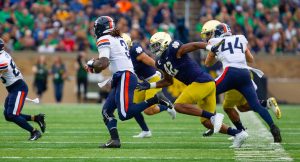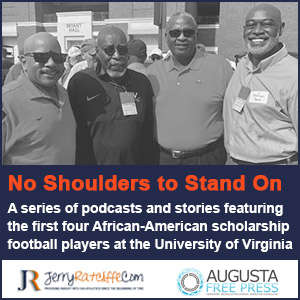Offensive-Line Problems Doom Virginia At Notre Dame
By Jerry Ratcliffe

UVA quarterback Bryce Perkins is pressured by Notre Dame’s Julian Okwara on Saturday (Photo: Notre Dame Athletics).
SOUTH BEND, Ind. — Virginia learned a valuable lesson when it stepped up into the big leagues of college football on Saturday. It’s almost impossible to win at this level without a decent running game.
While quarterback Bryce Perkins lit up 10th-ranked Notre Dame’s defense for 334 yards passing and two touchdowns, the Cavaliers’ ground game was almost nonexistent. Virginia was so one-dimensional that the Irish defense collapsed the pocket and sacked Perkins eight times while forcing five turnovers in a 35-20 win.
Notre Dame might have had to sweat this one had it not been for UVA’s miscues — four of the five led to Irish scores. Coach Bronco Mendenhall revealed after the game that he and his staff arrived in South Bend anticipating the outcome boiling down to a field goal, but the Cavaliers had no answers to counter their mistakes.
“Ultimately our inability to consistently protect our quarterback in the pass game was the difference in the game,” said Mendenhall of his team that dropped to 4-1.
After leading 17-14 at halftime, Virginia’s offense was smothered by the Irish, who realized the Cavaliers couldn’t run the ball, and couldn’t slow down the pass rush.
“To be blunt, most of it was a four-man rush from their base defense,” Mendenhall said. “It was simply an edge rusher technically beating an offensive tackle. They made the plays when they needed to.”
That had to be a point of emphasis in the Notre Dame locker room at halftime. Virginia had only 13 rushing attempts for a mere minus-two yards and it was painfully obvious that the Cavaliers couldn’t run the ball.
It was no secret coming in that UVA’s offensive line, though deeper than Mendenhall’s previous Cavalier teams, had struggled against Pitt, Florida State, and ODU. It was clear that if Virginia couldn’t run the football, then Notre Dame’s pass rushers could just pin their ears back and attack on every obvious passing down.
Perkins was under duress from wire-to-wire against an aggressive Irish team. Normally a dangerous runner, particularly when things break down on the line, the dual-threat UVA quarterback had averaged 48 yards rushing in the Cavaliers’ four games.
Saturday, he was minus-29, with 59 negative yards due to sacks. He couldn’t escape as normal because Irish coach Brian Kelly wanted to make sure the pocket closed in on him, preventing him from finding the outside scrambling lanes that the UVA quarterback normally exploits.
Instead, Perkins got hit, a lot, and hard. Clean shots that he never saw coming.
“It’s part of the game,” Perkins said afterward. “I’m good. My body’s good. I’m not too banged up.”
Not even feeling the hits?
“No man, I be eating my greens,” Perkins smiled in a can-of-spinach-munching Popeye kind of way.
Virginia learned two major lessons in absoring its first loss, and both of them concern the offensive line. Skeptics wonder if either of the glaring deficiences can be fixed, particularly in a bye week before taking it on the road to Miami in what could be a major ACC Coastal Division showdown.
Can the Cavaliers win a game like Notre Dame without a valid running game? We posed this question to Mendenhall.
“You can win a game, the quality of opponent certainly is going to matter,” the coach said.
Yes, the Wahoos can roll over William & Mary, beat Florida State, pull out wins over Pitt and ODU with a mediocre run game. But when you take it to the next level, you’re going to be exposed.
“You’re going to be able to win against some teams,” Mendenhall continued. “You won’t be able [to win] against teams to take over our league or to compete at a higher level, which is where we want to go from last year’s 8-5 team.
“The run-game development is the best way I can say is the fundamental backstory to pass protection, which is becoming frequent and obvious when we are going to throw it. That’s leading to turnovers. It’s sequential.”
Every Coastal Division coach is taking notes on those Wahoo problems and will be monitoring if anything changes going forward.
Going forward?
“We have to find the run game to start to provide some balance,” Mendenhall said. “To do it is a work in progress.”
It’s not like he can go out and trade for an upgrade along his offensive line. Somehow, he must demand more from an offensive line that can’t find its way, or find a way to scheme around it.
Otherwise, Virginia will have to depend solely on Perkins’ arm, which was spectacular at times Saturday in a 30-of-43 performance for 334 yards and two TDs, using mostly Joe Reed (9-107-1) and Hasise Dubois (9-143-1) as his effective targets.
“Perkins played flawlessly in the first half,” Kelly said.
True dat. He was 18 of 22 for 235 yards, both of his scoring strikes and no interceptions, was sacked only three times.
The second half was a different story, thanks to no run support.
“Man, you’re not going to be a great team unless you run the rock,” said UVA center Olusegun Oluwatimi. “That’s the step we have to take from good to great.”
Virginia is good. Good enough to have possibly pulled off the upset in the shadows of the Golden Dome on Saturday had it kept its quarterback upright and had any semblence of a running game.
Virginia is not great and won’t be unless it finds a real solution to this problem.
The ACC is watching.









